Читать книгу Sales EQ - Blount Jeb - Страница 13
На сайте Литреса книга снята с продажи.
3
THE IRRATIONAL BUYER
Approach Buyers the Way They Buy
ОглавлениеSelling is human. Buying is human. Both pursuits are woven into the imperfect fabric of human emotions. No matter what you sell, your sales cycle, or the complexity of the sales and buying process, emotions play a crucial role in the outcomes of your sales conversations, interactions, and deals.
Each time you (and the members of your selling team) and each stakeholder involved in the buying decision meet, those emotions collide.
Most salespeople begin the sales process from a position of logic and gradually shift toward emotion. In contrast, buyers tend to begin the buying process at the emotional level and over time shift toward logic.
At the beginning of the sales process, the buyer is asking a basic question about the salesperson: Do I like you? In the same moment, the seller is delivering a pitch on product features they believe will generate interest from the buyer.
Few things make sellers more unlikable than pitching. And so it goes throughout the buying journey. By the end of the sales process when the buyer is asking rational questions, putting objections on the table, and negotiating, the seller is reacting emotionally to perceived rejection, desperate not to lose the deal.
At the emotional level, the parties are perpetually out of sync (Figure 3.1).
Figure 3.1 Seller versus Buyer
Of course, I'm not blind to the oversimplification of this example. Human interaction is complex and often nonlinear. However, dealing with people in the context of sales conversations doesn't need to be overly complex or overwhelming.
A handful of principles and influence frameworks guide most human behavior. When you learn to master these simple frameworks, you'll become a master of emotions, influence, and persuasion.
I've already shared with you one of the most cogent truths in sales: People buy for their reasons, not yours. It follows, then, that to be effective, you must approach people the way they buy rather than the way you sell.
This new approach requires sales specific emotional intelligence – Sales EQ. Sales EQ is the ability to manage your own disruptive emotions while at the same time accurately interpreting and responding to the emotions of stakeholders, in the context of the sales and buying processes. As you'll learn in the upcoming chapters, it is this emotional control that sets ultra-high sales performers apart.
